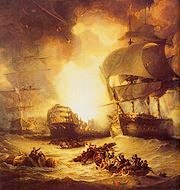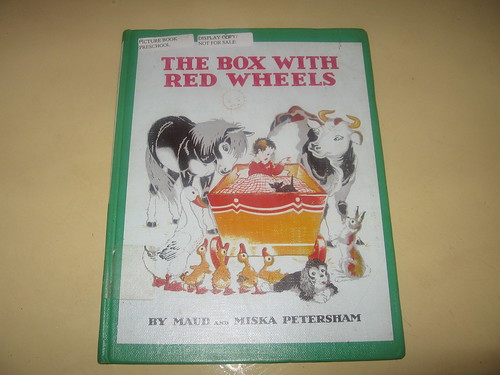Today is the birthdate of Felicia Dorothea Hemans, born in 1793. She wrote at least one well known poem, Casabianca, based on an historical incident: “Young Casabianca, a boy about thirteen years old, son of the admiral of the Orient, remained at his post (in the Battle of the Nile), after the ship had taken fire, and all the guns had been abandoned; and perished in the explosion of the vessel, when the flames had reached the powder.”
 The boy stood on the burning deck
The boy stood on the burning deck
Whence all but he had fled;
The flame that lit the battle’s wreck
Shone round him o’er the dead.
Yet beautiful and bright he stood,
As born to rule the storm;
A creature of heroic blood,
A proud, though child-like form.
The flames rolled on–he would not go
Without his Father’s word;
That father, faint in death below,
His voice no longer heard.
He called aloud–’say, Father, say
If yet my task is done?’
He knew not that the chieftain lay
Unconscious of his son.
‘Speak, father!’ once again he cried,
‘If I may yet be gone!’
And but the booming shots replied,
And fast the flames rolled on.
Read the rest of the poem, including the tragic ending.
Ms. Hemans’ poem has been remembered so long mainly because of its parodists:
 The boy stood on the burning deck,
The boy stood on the burning deck,
The flames ’round him did roar;
He found a bar of Ivory Soap
And washed himself ashore.
The boy stood on the burning deck
Eating peanuts by the peck;
His father called, he would not go
Because he loved those peanuts so.
The boy stood on the burning duck
A stupid thing to do
Because the duck was roasting
On the barbecue.
The boy stood on the burning deck
Playing a game of cricket,
The ball flew down his trouser leg
And hit his middle wicket.
The boy stood on the burning deck,
His heart was a all a-twitter,
He stood ’till he could stand no more,
And became a crispy critter.
Spike Milligan:
The boy stood on the burning deck
Whence all but he had fled –
The twit!
The two paintings of the Battle of the Nile are by George Arnaud or Arnold(?).


 Upton Sinclair, b. 1878, socialist author of The Jungle, a novel about the meat-packing industry that resulted in passage of The Pure Food and Drug Act (1906) and The Meat Inspection Act (1906)).
Upton Sinclair, b. 1878, socialist author of The Jungle, a novel about the meat-packing industry that resulted in passage of The Pure Food and Drug Act (1906) and The Meat Inspection Act (1906)). 

